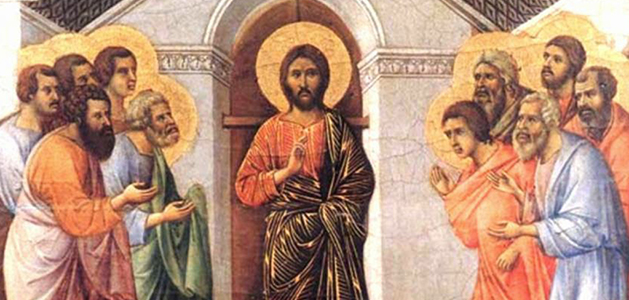‘As the Father sent me, so I also send you.’ (John 20:21)
Thought for the week: Janet Scott reads from the Gospel of John

We are so accustomed to the dramatic account of the giving of the Holy Spirit at Pentecost, with its ‘mighty wind’ and ‘tongues of flame’, that we often overlook this gentler story in John. Here, on the evening of the resurrection, Jesus himself gives the Spirit to his disciples. For John, as for Acts, this is in effect the church-founding moment, setting the pattern and the agenda for the community.
It is a transforming moment. The disciples are fearful, behind locked doors. The presence of the risen Jesus brings them joy and peace. They know the cost. Jesus shows them his wounds. The resurrection does not cancel the crucifixion, it incorporates it. It is a moment of new creation. Just as in Genesis God breathes the creature of dust into life, so Jesus breathes the Spirit into his followers. The same verb, ενεφυσησεν (enephusesen), is used as in the Septuagint, Greek, version. They are a new humanity.
This new community is given both a mission and an authority. The mission is a sending out. John uses two verbs for ‘sending’. Jesus was sent by the Father, αποστελλειν (apostellein), but Jesus sends the disciples using πεμπειν (pempein). Perhaps John does this to suggest that not all have the role of apostles, but that between them the community will fill all Jesus’ roles. Some will be healers, some teachers, some preachers, some will build up communities, some will resist injustice. All will need to be connected by the love for each other that Jesus commanded, and by the indwelling Spirit which he gives them to teach, lead and empower them.
With the gift of the Spirit comes the authority to deal with sin. The first half of verse 23 deals with the forgiveness of sins, and uses the same verb for forgiveness (αφιημι, aphiemi, letting go) as is found in the Lord’s prayer. I am grateful to Elaine Miles for pointing out that the second half of the verse is more difficult to translate (24 April). The translators may have been influenced by the nearest parallels in Matthew 16:19 and 18:18 where the language used is of opposites, binding and loosing. These verses are not necessarily about sin, but are more likely about decision making and discernment.
John is writing about sin (αμαρτία) but uses the verb κρατειν, which has a range of meanings mostly to do with power, strength or control. Perhaps the best translation here is with the word ‘overcome’: ‘whoever’s sins you let go, they are let go for them, and whoever’s you overcome, they are overcome’. This means that the discernment is not between what is and is not forgivable, but between what can be forgiven easily and what needs harder work. We can see this as a promise that when we deal with, say, war, injustice and poverty, we shall overcome!
The sense of the presence of the Spirit in our Meetings is not just for our own enjoyment. It is to send us (even as we stay at home), each in our own way, to live like Christ, with the power to love, to forgive and to overcome.
You need to login to read subscriber-only content and/or comment on articles.
